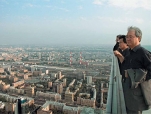Whether the World Needs Skyscrapers?

Recently, controversy over high-rise building construction erupted with renewed force. The vexed question of whether the world needs skyscrapers, or one can do without them, holds leading positions in the ranking of professional debate for many years. For their opinion, we asked the experts in the field of high-rise building construction - Dr. Sang Dae Kim, President of the CTB UH, professor of Dept. of Civil, Environmental and Architectural Engineering at Korea University, POSCO Steel Chair Professor, which was founded to promote structural steel’s research in construction by POSCO, and his colleagues - Dr. Chung Kwang Ryang, DongYang Structural Engineers President and Adjunct Professor Architectural Eng. Korea University President, founder and chief architect of the company SIA PLAN Architects and Planners - JuHwan Cho.
Whether it is possible dispensing with skyscrapers or high rise construction imposed by the necessity of the world economy?
According the UN estimates that by 2050, world population will reach nearly 9.5 billion people. Cities simply are unable to accommodate so many people, if they would build only horizontally. Besides such developments, at least are economically disadvantageous. Sooner or later a critical mass of inhabiting there people attains menacing character, because the city size can not be increased indefinitely. Thus, the economic peculiarities and the impossibility of an infinite expansion of the cities boundaries stimulate high-rise buildings construction.
What are the consequences of cessation of high-rise buildings construction?
Let us assume, due to constantly growing population of the city it time to time extends its own boundaries. And where will these changes lead us? Will be increased the energy load, will repeatedly increase traffic flow, and all this will inevitably affect the deterioration of the environment. The distance that a person should overcome to carry out activities of daily living, also will be increased many times. Let us take Moscow as a case study. It is estimated that the average time for a person to travel to one’s workplace in Moscow is one hour. The need to move such long distances leads to the fact that people, being for eight hours in the workplace, have to spend hours on traveling, and as a result almost no remains time for privacy.
Full version you can download here
 Text by Nina Nasonova
Text by Nina Nasonova


